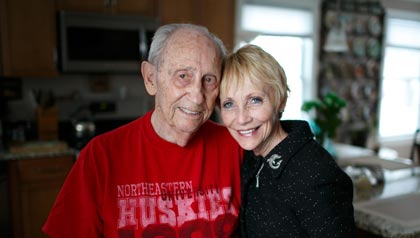AARP Eye Center

At 101, Lester Kenner does not drive anymore, but he does his laundry and takes out the trash.
Kenner, a World War II veteran, shares a house with his daughter in Boston, where he likes to listen to audiobooks, read on his Kindle and play with the family pets.
“I have weathered well,” he said with a laugh.
His daughter, Carole Kenner, is dean of the School of Nursing at Northeastern University. Her job demands long days and overseas travel, and she said she needs help caring for her dad.
Meals on Wheels provides Lester with lunch five days a week. Carole hires someone for light housework and to keep Lester company a few hours a week. But she needs someone to come in to make dinner, especially when she travels for her job.
Based on his age and income, Lester qualifies for state-subsidized home services including meal preparation, companion assistance, and transportation to and from doctors’ appointments. But he spent nearly two months on the waiting list of one of 27 home care agencies because the state has not budgeted enough money to meet the demand. Over 1,200 Massachusetts residents are on such lists.
“Dad is not an exception to the rule anymore,” Carole said. She said more people are living longer and want to stay in their homes and communities.
Services save money
About 60,000 older Massachusetts residents receive some home services during the year, according to Al Norman, executive director of the nonprofit Mass Home Care—a network of about 30 agencies that advocate for and assist older people.
The state saves money when people are able to stay in their homes, Norman said.
“Massachusetts needs to keep investing in home care to keep that dividend going.”
The cost of home services varies depending on the level of assistance provided. Basic home care (generally about three hours a week in personal care) costs about $3,200 per year, but extensive community-based care can cost up to $14,400 a year.
A typical Medicaid-paid nursing home in Boston costs about $65,000 per year.
More than 650,000 households in Massachusetts include someone over the age of 65.
Norman and about 100 other people rallied at the State House in January, urging Gov. Deval Patrick (D) to eliminate the home care waiting lists.
Patrick’s $34.8 billion proposed budget for 2014 is nearly 7 percent higher than the current budget, but the amount for home care services is about the same—$180 million.
Norman said an additional $20 million is needed for home care services to eliminate the waiting list. AARP Massachusetts supports that increase.
Penny-wise, pound-foolish
“That’s what seniors want, that’s what their families want,” said Michael E. Festa, AARP Massachusetts state director and a former state secretary of elder affairs.
AARP wants the state to allocate enough money to provide services to people who are eligible for them, not expand the level of services, he said. Failing to eliminate the waiting lists “is penny-wise and pound-foolish,” Festa said.
AARP Massachusetts is urging its members to contact their legislators at 888-259-9789 toll-free and urge them to sufficiently fund home care services.
The House and Senate will use the governor’s proposal as a starting point as they craft a budget by July 1. But spending for programs could be cut if tax increases proposed by Patrick are rejected.
Senate President Therese Murray (D-Plymouth) said in a statement to the AARP Bulletin that keeping people healthy and in their homes will cost the state less in the long run, but she did not say whether she would support an increase in home services spending.
“We recognize the value of home care services and have made consistent efforts, even under serious budget constraints, to take advantage of the benefits these services provide,” she said.
Dale Mitchell, executive director of Ethos, a nonprofit that provides home care services to five Boston neighborhoods, scoffed at Patrick’s budget and the idea that “a 101-year-old man is expected to wait indefinitely for help with his basic activities of life. The waiting lists will just continue to grow.”
—By Jean M. Lang























































